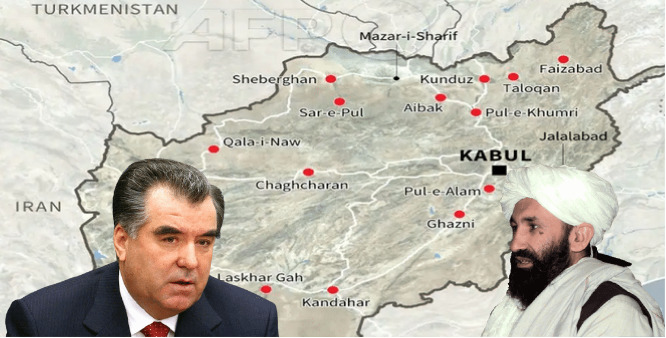The Taliban’s rise to power has set in motion a grand reset in South and Central Asia, purely in geopolitical terms. Countries in the region are no longer willing to engage with the Taliban, except for China and Pakistan, who of course, have their petty interests to cater to, by wooing the violent extremist organisation. Now, Afghanistan is among the most diverse countries in the world- which only further exacerbates its societal fault lines. Owing to this societal heterogeneity – and the hegemony of the Pashtuns in the country, who form the dominant community, Afghanistan has always been volatile. Now that the Taliban has established its regime in Afghanistan once again, the societal fault-lines of the country are only set to worsen.
Composition of Afghanistan
Sure, the Pashtuns are the dominant community in Afghanistan. The Taliban is entirely comprised of Pashtuns. However, in Afghanistan, there is a large number of Tajiks, comprising more than 30 per cent of the population. Then there are the Hazaras, who constitute close to 15 to 16 per cent of the population. There are also the Baloch, Uzbeks, Aimaqs, and others. Meanwhile, the British-era division of the region was carried out in such a way that Pashtuns got divided between Pakistan and Afghanistan. Still, Pashtuns constitute the majority in Afghanistan. Nonetheless, there exists a palpable conflict between the Taliban and Pakistan over the Durand Line, which is the de facto Afghan-Pakistan boundary.
The Tajik Equation
While Pakistan and the Taliban are madly embracing each other right now, Tajikistan and Russia, and perhaps even other Central Asian countries may be looking to break up Afghanistan to free Tajiks, Uzbeks and other minorities from Taliban’s rule. A master plan is at work. Recently, Tajikistan awarded two deceased Afghan political and military leaders, former President Burhanuddin Rabbani and legendary Afghan guerrilla leader Ahmad Shah Massoud, with the ‘Order of Ismoili Somoni’, Tajikistan’s highest honour.
Read more: Russia’s friend Tajikistan is firing up anti-Taliban forces and humiliating Pakistan while at it
It may be noted that Massoud was known as the Lion of Panjshir and led the strongest resistance against the Taliban from his stronghold in the valley until he was assassinated two days before 9/11.
Tajikistan is therefore trying to draw the link between the ongoing Resistance against the Taliban from the Panjshir Valley, which is called the Northern Alliance and the huge stake of Tajiks in the ongoing turmoil inside Afghanistan.
The Tajiks abhor the Taliban. Tajiks and Uzbeks are not as highly radicalised as the Taliban. Secondly, the Tajiks and Uzbeks are ethnically different from the Pashtuns. They are minorities in Afghanistan who are targeted by the Pashtun majority Taliban, and therefore it is very natural for both the Tajiks and the Uzbeks to feel insecure under the rule of a Pashtun-dominated group, the Taliban.
The Partition of Afghanistan
The ethnic minorities of Afghanistan are concentrated mainly in the country’s northern provinces. Thus, they have dominion over Afghanistan’s northern areas, and if they decide not to live under Talibani rule, there is nothing which the terror organisation can do to force them to remain subservient. Sure, the Taliban might be registering temporary victories, but the reality is that Russia and Central Asian countries are looking to weaponise the sentiments of Afghan minorities, especially Tajiks, against the Pashtun-comprised Taliban.
For Tajiks and Uzbeks, the best-case scenario would be to defeat the Taliban and establish a democratic government in Afghanistan that respects minority rights. However, such a turn of events seems quite unlikely. In the present circumstances, it makes a lot of sense for the Tajiks and the Uzbeks to seek a separate nation, which is free from Taliban-led extremism.
Both Tajikistan and Uzbekistan do feel an ethnic connection with Afghan minorities. Interestingly, Tajikistan claimed that Tajiks make up more than 46 per cent of the Afghan population. Here, the number “46 per cent” is quite significant. What Dushanbe is doing is trying to do is raise the stakes of the Tajiks in the war-torn nation. Now, even Tajikistan understands that defeating the Taliban militarily isn’t a cakewalk. So, a practical solution is to disintegrate Afghanistan itself.
Tajikistan is the leading country in helping the Northern Alliance fight against the Taliban. The Northern Alliance operates from Afghanistan’s Northern region where most of the Uzbeks and Tajiks live. Meanwhile, there were reports about Tajikistan openly arming the resistance front which is fighting against the Taliban. The Northern Alliance led by Ahmad Massoud and Amrullah Saleh was said to have received military equipment, weapons, and other supplies from Tajikistan.
Breaking the Pakistan-Taliban Terror Nexus
All Central Asian nations, alongside India and Russia, agree that the nexus between Pakistan and a Taliban-ruled Afghanistan is a security nightmare for Asia as a whole. Therefore, by carving out a non-Pashtun dominated independent state out of Afghanistan’s current northern provinces, Russia and its allies might be looking to make the Taliban thirsty for more land. The Taliban eyes Pakistan’s provinces, including the NWFP, Balochistan and Khyber Pakhtunkhwa for itself, as these house significant Pashtun populations. If the Taliban were to lose Afghanistan’s northern provinces, it would have to expedite plans for taking over Pakistani territory to create a ‘Greater Pashtunistan’.
It is here that the romantic friendship between Pakistan and the Taliban will come to a screeching halt. Even if Afghanistan is not immediately broken up into two halves, the very perception of northern provinces forming a new, independent nation will motivate the Taliban to compensate for potential losses by beginning to wage a campaign against Pakistan, whose sole purpose will be the ‘liberation’ of Pashtun land currently under Islamabad’s control.
A great geopolitical game is underway in Asia, and the future is hardly magnificent for either the Taliban or Pakistan.
